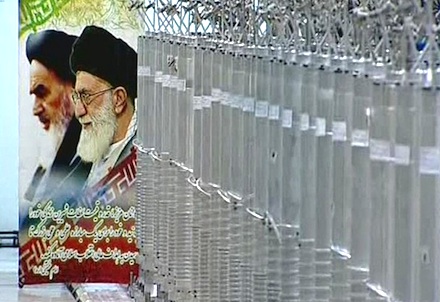به زبان فارسی
PICTORY
LATEST MUSIC
SEARCH
Iran Can Be Deterred?
by Toby Greene
09-Apr-2012
Last week, Zbigniew Brzezinski, who was Jimmy Carter's national security advisor, was sounding pretty relaxed about the prospect of Iran getting nuclear weapons. He told an audience at the Council on Foreign Relations:
"Why should I be so concerned if I dealt with the Soviet Union, which had 4,000 weapons, and I remember being woken up one night at 3:00 a.m. to be told by my military assistant that we are under nuclear attack. It obviously didn't happen, since we're all here. (Laughter.) There would have been... 85 million Americans and Soviets dead six hours later... We deterred them. If we can deter the Soviet Union, if we can deter North Korea, why on earth can't we deter Iran?"
Setting aside the question of Iran, that sounds like a great Cold War story right? And of course, his interviewer asked for the full version. So Brzezinski went on:
"Part of my job was to coordinate the response if something like that happened, to notify the president. I had three minutes in which to notify him. During those three minutes, I had to confirm it in a variety of ways. And then he would have four minutes to decide how to respond. And then 28 minutes later, some of us would be dead and we'd be living in a different age... I got a message from my military assistant, a general, who simply woke me up at 3:00 a.m. at night on the red phone and said, "Sorry to wake you up. We're under nuclear attack." (Scattered laughter.) That kind of wakes you up... And he adds 30 seconds ago, 200 Soviet missiles have been fired at the United States...vBut there were subsequent confirmations and clearly within -- well, within actually almost two minutes prior to me calling him on the third minute, it was clear that this was a false alarm. So I did nothing. I went back to sleep. (Laughter)"
The interviewer laughed. The audience laughed. You have to admit, it's a great story.
But then came the real punch line. The interviewer asked, "And if the confirmation had been a little late, could we have had a problem?" Brzezinski's answer: "We might have had."
Hang on. Wasn't the point of this story supposed to be that deterrence works? That a nuclear armed Iran can be deterred just like the Soviet Union was in the 'good old days' of mutually assured destruction? Somehow I don't feel all that reassured.
This 3am story depicts another reality entirely: a dangerous and unstable stand-off with the constant possibility for screw-ups and miscalculations to send the two sides to the brink. And the USSR and the US were supposedly rational actors, with diplomatic relations, emergency hotlines and the rest. Now imagine this kind of standoff overlaid with the rivalries, suspicions and hostilities of the Middle East.
During the Cold War, the West did not have much choice but to pursue a policy of deterrence, because the Soviets already had the bomb. But with Iran, we do have a choice. Iran is on the way to having a bomb, but with enough international pressure, it can still be stopped.
Just because the Cold War ended without disaster, does not mean it was destined to end that way. In Brzezinski's own words, "We might have had [a problem]". With regard to Iran, we should not be reassuring ourselves with the thought that a situation akin to the Cold War is an acceptable outcome.
When Iran meets with P5+1 powers to negotiate over its nuclear programme next week, it should be in no doubt that the West is determined to stop it acquiring nuclear weapons, and is not content to fall back on a strategy of deterrence. The economic and diplomatic pressure needs to be intensified, with all options kept on the table, to prevent Iran getting the bomb, and to avoid recreating the conditions of Brzezinski's 3am phone call.
First published in HuffingtonPost.com
AUTHOR
Dr. Toby Greene is the Director of Research for BICOM. He was awarded his PhD from UCL for his thesis on British policy in the Israeli-Palestinian arena in the wake of 9/11. His first book, ‘Blair, Labour and Palestine: Conflicting Views on Middle East Peace After 9/11’, will be published by Continuum in early 2013.
RECENT COMMENTS
IRANIANS OF THE DAY
| Person | About | Day |
|---|---|---|
| نسرین ستوده: زندانی روز | Dec 04 | |
| Saeed Malekpour: Prisoner of the day | Lawyer says death sentence suspended | Dec 03 |
| Majid Tavakoli: Prisoner of the day | Iterview with mother | Dec 02 |
| احسان نراقی: جامعه شناس و نویسنده ۱۳۰۵-۱۳۹۱ | Dec 02 | |
| Nasrin Sotoudeh: Prisoner of the day | 46 days on hunger strike | Dec 01 |
| Nasrin Sotoudeh: Graffiti | In Barcelona | Nov 30 |
| گوهر عشقی: مادر ستار بهشتی | Nov 30 | |
| Abdollah Momeni: Prisoner of the day | Activist denied leave and family visits for 1.5 years | Nov 30 |
| محمد کلالی: یکی از حمله کنندگان به سفارت ایران در برلین | Nov 29 | |
| Habibollah Golparipour: Prisoner of the day | Kurdish Activist on Death Row | Nov 28 |



